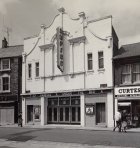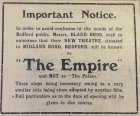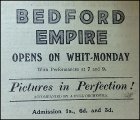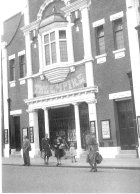Bedford
Cinema History
Places > Bedford > Cinemas > Bedford Cinema History Project
The Empire/Granada 3 Cinema
27 Midland Road, Bedford
Home | Empire | Sources | Images
The Empire Cinema
 An
advertisement in the Bedford Mercury announced that the Bedford Empire, a new
electric cinema, would open on Whit Monday 1912. Commissioned by Bill
and Ernie Blake, Blake Bros (Theatres) Ltd., the Empire cinema opened on 27th
May 1912 at 27 Midland Rd., Bedford. It was so popular that people had to be
turned away. Films shown on the opening night included, Deep Sea Diving
and Doing His Duty. Throughout the show of silent films, the Empire
Orchestra, directed by Haydn Farnhill played ‘appropriate music’.
An
advertisement in the Bedford Mercury announced that the Bedford Empire, a new
electric cinema, would open on Whit Monday 1912. Commissioned by Bill
and Ernie Blake, Blake Bros (Theatres) Ltd., the Empire cinema opened on 27th
May 1912 at 27 Midland Rd., Bedford. It was so popular that people had to be
turned away. Films shown on the opening night included, Deep Sea Diving
and Doing His Duty. Throughout the show of silent films, the Empire
Orchestra, directed by Haydn Farnhill played ‘appropriate music’.
The following week, on 31st May 1912, The Mercury carried a detailed account
of Messrs Blake Brothers’ ‘latest and greatest’ cinema which had been ‘wholly
built, furnished and designed by local firms’. With a spacious and imposing
interior hall, a grey, blue and white décor and red upholstered seats, the whole
cinema had been created for the comfort of its patrons without regard to cost.
The cinema, designed by local architect E.H.C Inskip, had capacity for 200 seats
in the circle and 374 in the stalls. Darlow’s gun shop on Midland Road had been
demolished to make way for the new picture house. A photograph of the shop after
it had been sold shows advertisements in the windows for the ’New Electric
Palace Cinema’.1. In the event, the Blakes named their new place of
entertainment ‘The Empire’ because Percy Felce had already used that name for
his recently opened cinema in the High Street.
News reels brought in the audiences and it was proudly advertised that the
Empire had shown a film of the Derby at 8.35pm on the very day that the race had
been run in June 1912.
From the outset, the Blakes had designed the Empire for variety shows and
concerts as well as films. On the opening night the stage was still being
constructed. A Beds Times report 16th April 1915 described the Empire as packed
with soldiers for a concert which included music by the band of the 6th
Argylls and Sutherland Highlanders. And in June that year a ‘turn’ at the Empire
was provided by The Five Sisters accompanied by two grand pianos, two
mandolins and a flute and later in October, the Dental Riskits performed
deeds of daring on the trapeze. During the First World War years, the Blake
brothers allowed the Empire to be used without charge, for weekly Sunday evening
concerts to entertain the troops quartered in Bedford. At a concert given in
April 1919 marking the end of hostilities, they were sincerely thanked by the
Bedford Borough Recreation Committee for the Troops for their public
spirited action.
There were two evening shows at 7.00 and 9.00 pm with matinees at 3.00pm on
Wednesdays and Saturdays. By 1925 there were matinee screenings each day. The
programme changed twice a week. 1930 saw a dramatic change in film exhibition at
the Empire. For in March that year the Bedfordshire Times announced, ‘In the
near future, the programme at the Empire will be an all talking one of the best
quality’ and reported that the latest Western Electric sound equipment had been
installed. The following month, the Empire announced a ‘Sensational opening of
the talkie season’ with The last of Mrs Cheyney. The Bedfordshire Times
reported favourably. Such was the novelty that advertisements carried the line
‘See and hear the talkies in Bedford’s most perfect theatre for sound.’
Bedford’s Plaza cinema introduced talkies the same month but the rival
Picturedrome cinema had been the first to screen a film with sound at the
end of December 1929. On December 28th 1934, the Empire was sold to Granada
(Bedford). By 1935, continuous film programmes were shown between 2.00 pm and
11.00pm.
Also in June that year, 'Happy kiddies’ matinees' on Saturday mornings at 10
o’clock, priced 3d, were advertised. Apparently the Empire was the first cinema
in Bedford to do this. Regular attendance was rewarded by a tin badge and a
membership card to record visits. The morning shows were so popular that
children queued all the way down Allhallows to get in.
Cinemascope arrived in December 1954 - the second Bedford cinema to
make the change – and there was a grand opening attended by the mayor and
accompanied by a fanfare of trumpets from the Sea Cadets, to celebrate this as
well as a refurbished and improved Empire, (heating and lavatories in the circle
and better ventilation). The Bedford Record reported ‘The wide screen and all
the grandeur of Cinemascope come to a transformed Empire’. The manager at the
time was Gwyn Howells. In July 1959 at the Bedfordshire County Council Stage
Plays Committee meeting it was noted that, Ronald Ernest Blake (grandson of the
original proprietor Ernie Blake) was the new manager of the Empire Cinema and
cinematograph licence holder. He managed the cinema until 1966. The Empire was
one of the Bedfordshire cinemas used by the Committee for viewing and making
decisions on films. Ernie Blake continued to be very involved with the cinema
eventually retiring January 15th 1966.
By the 70s, despite improvements, the Empire was struggling. Midnight matinees were introduced in 1970 and the following year, the Granada Group re-decorated the interior and re-equipped the Empire with an updated projection suite using Westar projectors and Westrex sound amplifiers. At the time, it was claimed that the Empire was one of the best-equipped theatres in the Granada Group. However, the cinema had gained a reputation for showing mainly sex and horror films - a ‘well known hall of x films’ and in the mid 70s, articles on the future of the Empire began appearing in the local press ‘An Empire on which the sun may soon set’. In the Autumn of 1975 the cinema closed initially for a short period, supposedly for lack of suitable films to show. In the event, it re-opened the following year when a renovated Empire became part of the Granada in St Peters. Re-launched in April 1976 as Granada 3 with just one evening showing each day, its first film was Death Race 2000.
The Empire still failed to run profitably and Granada (Bedford) Ltd. closed the cinema on 20th June 1977. Despite objections that the cinema building was of architectural merit, it was demolished, in September 1977 and later replaced by an Eastern Electricity showroom. The Bedfordshire Times commented that the demolition was the last chapter in the Empire’s fall from grace.
1. Bedford Library Newspaper Cuttings Collection: Cinema: No.46a, from Bedfordshire Times, 3rd February 1978.
Information from Hilary McDonald 2013
Sources
Books and Magazines (available at Bedford Library)
- Violet Groocock. Recollections of the Empire Cinema, Bedfordshire Libraries, Library Link Magazine, Spring 2000 pp. 16-17
- J. Hamson. Bedford Borough Recreation Committee for the Troops. A Record of Four and a Half Years Voluntary Work. August 20th 1914 to March 31st 1919 (Bedford Heritage Library)
- G.C. Peck. Bedfordshire Cinemas. Bedfordshire County Council, 1981
- Philip Standley. Cinemas in Bedford 1898-1978, Bedfordshire Magazine vol. 17 pp. 122-127
-
R. Wildman. Bygone Bedford, White Crescent Press,
1974
(Image no 62 of Midland road before Empire built showing gun shop).
Newspapers (available at Bedford Library)
- Bedford Entertainments. The Empire, The Bedfordshire Mercury, 31st May 1912 p.8 (Detailed description of the new cinema)
- Bedford Entertainments, The Empire, The Bedfordshire Mercury, 7th June 1912 p.8
- Plays and Pictures: Talkies at the Empire, Bedfordshire Times and Independent, 7th March 1930 p.11
- Cinemascope’s ‘The Command’ at Empire, Bedford Record and Circular, 21st December 1954 p.2
- New-Look Empire, Bedford Record, 24th August 1971 p.11
- New life for the Empire, Bedfordshire Times, 9th April 1976 p.9
- It’s curtain time for the oldest cinema in town, Bedfordshire Times, 18th March 1977 p.9
- It’s the last picture show, Bedfordshire Times, 9th September 1977 p.3
- Leslie Jack Lee. I remember it all, Bedfordshire Times, 30th November 1990 p.10
Images
Page last updated: 19th May 2014



